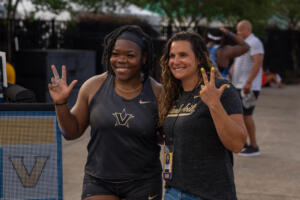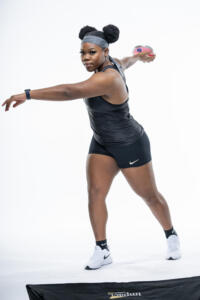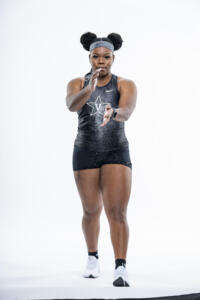New PR of 58.57m for Veronica Fraley on day 1 of Tucson Elite!🏜 #THROvacs #Discus #Coach #AnchorDown pic.twitter.com/YvtNJtqgkB
— Ashley Kovacs (@ashleykovacsusa) May 20, 2022
Rebuilding the Engine
by Graham HaysVanderbilt's Veronica Fraley reached World Championships in discus by daring to grow
SEC discus champion Veronica Fraley will compete in the discus and shot put during the NCAA Outdoor Track and Field Championships June 7–10. This story originally ran ahead of the 2022 World Championships.
NASHVILLE, Tenn. – The first time Veronica Fraley threw a discus while representing Vanderbilt, she broke the school record. She promptly broke it again with her second throw, sailing the one-kilogram metal disc 59.9 meters, or almost 200 feet, through the darkening evening sky during June’s USA Track and Field Championships in Eugene, Oregon.
All-American Divine Oladipo had established the previous school record earlier this year, shattering a mark that had stood for more than 20 years at the time. Fraley’s new record surpassed Oladipo’s achievement by 15 feet, meteoric change in an event where incremental progress is the norm. Yet the achievement passed without fanfare. In that moment, being first in school history didn’t matter as much as finishing fourth in a competition that featured the nation’s best throwers, including the reigning Olympic champion.
On the strength of her performance in the USATF Championships, Fraley entered the top 32 in the world rankings for the first time. That qualified her to return to Eugene this week to represent the United States in the World Athletics Championships—the biennial global competition that pairs with the Olympics as the twin pinnacles of track and field.
In 2021, shortly after she earned All-America honors at Clemson, Fraley had competed in the U.S. Olympic trials, finishing just few meters shy of the top tier of throwers vying for trips to Tokyo.
On a journey that began when she was a middle schooler who picked up a discus because she wanted a break from running during summer track camp, she saw the finish line—being the best in the world—as a surmountable distance away.
So she dared to choose a different path forward. Young enough to believe in her abilities and in sheer stubborn inertia, she transferred from Clemson to Vanderbilt, undergraduate degree in hand. With the mentorship of associate head coach Ashley Kovacs, who also is the throws coach for the U.S. national team, she found those extra meters by starting from scratch.
“I knew that I wanted to get better,” Fraley said. “I knew there were people out there throwing, 10, 12 meters more than me. So, in my head, I knew there was something still to learn. I just didn’t know what it was. I needed to go to a place where somebody at the top of the field can show me what it is. And hopefully be patient enough to allow me to catch up.”

“It’s a different dialogue, a different way of thinking about something you’ve been doing for a long time. She stuck with it. That’s the hardest part, being willing to break it down that far. Once you do that, you don’t really know where you’re at. You lose your bearings.”
Vanderbilt associate head coach Ashley Kovacs (above with Fraley)
Finding a home at Vanderbilt
By the time Fraley decided to enter the transfer portal after the 2021 outdoor season, she had already accomplished more than most peers. In her final Clemson season, she qualified for the NCAA Outdoor Track and Field Championships in discus and in shot put. She still holds Clemson’s school record in discus and recoded the second-longest throw in shot put. In the classroom, where she earned a degree in health sciences with a minor in Spanish, she received ACC All-Academic honors and participated in the Clemson University Honors College program.
While working to complete her degree a semester ahead of schedule, she took a step back from training last fall. A doctor’s daughter who may yet follow in her mother’s footsteps and attend medical school, she worked what amounted to almost full-time hours during an internship at an area clinic that served an underserved community. The work was rewarding, calling on both her medical interest and her language skills as she processed incoming patients and helped a largely Spanish-speaking clientele translate medical information. It also left little time for athletic training. As she looked at prospective schools, she told coaches she wouldn’t arrive in peak throwing form.
For Kovacs and director of track and field and cross country Althea Thomas, that message wasn’t a negative. Kovacs knew from her Clemson results that Fraley had talent. What stood out in their conversations was Fraley’s commitment to her field of study and willingness to do the work necessary to achieve her goals. The coach knew she could help Fraley remove any rust. She also saw that Fraley naturally had something that no one could give her—the drive and discipline necessary to succeed academically and athletically at Vanderbilt.
“The system and the way that I do things, it forces them to be pretty mature,” Kovacs said. “It works out well at a place like Vanderbilt, where the kids just are more mature than most because of the type of institution that Vanderbilt is. They come in and they want a top-level experience. They wouldn’t be at an academic institution like this if they weren’t striving for the top level.”
That was what Fraley, who knew Oladipo well and picked her friend’s brain about what it was like working with Kovacs, wanted from a new experience. So, barely 48 hours after receiving her degree in South Carolina, she arrived in Nashville to get started.
Rebuilding the engine
Kovacs’ husband and world champion shot putter Joe Kovacs likes to describe her coaching as a process of burning down the house to build anew. Ashley Kovacs herself prefers a metaphor that is more benign and perhaps a little more accurate. To her, helping someone reach their potential is like taking apart a high-performance car, studying each piece to find and fix design flaws, cleaning rusty ones until they gleam and, finally, getting the vehicle back on the road.

“When you put it back together, the car probably runs better than it did before,” Kovacs said. “But you’ve got to know how to take it apart and how to put it back together.”
The college track and field calendar can present an insurmountable degree of difficulty. There isn’t time to take steps backward and still be ready for the SEC or NCAA championships. But after Fraley and the Vanderbilt coaching staff agreed that she would redshirt competition this spring, time wasn’t a problem. In their first two months together, Fraley and Kovacs didn’t even complete a throw. Instead, they worked through each small movement, looking to refine details such as mobility and the amount of torque and stress leading up to release.
“It’s a different dialogue, a different way of thinking about something you’ve been doing for a long time,” Kovacs said. “She stuck with it. That’s the hardest part, being willing to break it down that far. Once you do that, you don’t really know where you’re at. You lose your bearings.”
There is also, of course, a great deal of sweat equity involved in progress. Throwing events are about much more than brute strength, but strength is a necessity. Even without the immediate payoff of competitions in the winter and early spring, Fraley approached each weightlifting session with an intensity that impressed even Kovacs, who isn’t easily impressed.
As spring arrived and the technical and physical work continued, Fraley and Kovacs had reassembled the engine and started to see real-life improvement. NCAA rules permit student-athletes who aren’t competing for their college team to compete on their own (“unattached,” in the rules parlance) in some competitions. In late March, at the Raleigh Relays in her North Carolina hometown, Fraley won the discus competition by nearly three meters, nearly matching her personal best.
By May, while competing as an unattached athlete in the USATF Throws Fest in Tucson, Arizona, Fraley again took first place and set a new personal best with a throw of 62.3 meters. Among those she beat in the desert was Rachel Dincoff, who had been a member of the U.S. Olympic team the previous summer. And three weeks later, Arizona State’s Jorinde van Klinken, a Dutch Olympian, would win the NCAA discus title with a throw of 62.16 meters.
The race to qualify for Worlds
Fraley’s success in the Tucson meet propelled her from the mid-70s to the mid-40s in the world rankings. With the World Championships quickly approaching, that was close enough to the top 32 to put new options in play.
Collegiate events like the Raleigh Relays didn’t offer enough points to help Fraley make a final push up the rankings, so she scrambled to find events elsewhere. A few days after the Vanderbilt contingent traveled to the NCAA Outdoor Championships, Fraley trekked to a meet in Burnaby, British Columbia. She won the discus there, too, again reaching 62.3 meters. Again, she climbed in the rankings.
If she finished at least fourth in the U.S. Championships and threw well—she needed both result and distance for maximum points—she had a chance to qualify for the Worlds.
A year earlier, Fraley had arrived at the Olympic trials largely carefree because she knew that even her personal best at that time wasn’t likely to get her close to competing for an Olympic spot. But this year, her goal was in reach—so the butterflies began almost as soon as she left the meet in British Columbia.
Kovacs didn’t shield her pupil from the stakes. There was no point in downplaying the significance, so she instead told Fraley to trust her training. Sure, she might be nervous. But because she had done the work—deconstructing and reconstructing her technique—she had the tools to channel those nerves into performance. Trust the engine, in other words.
So she did. She never completely shook the butterflies, and she still worried until the final challenger’s final throw in Eugene. But in the moments inside the ring? Fraley felt calm. That part was familiar—just like throwing into a net in Nashville.
“The only thing I was really thinking about were the three technical cues I repeat in my head all the time,” Fraley said. “Honestly, as long as those happen, the big throws are going to be there. I try not to think about just the numbers because that can push you down a rabbit hole that is not very helpful.”

Her second throw traveled 59.9 meters—putting her in fourth place and thus high enough to qualify. She remained there as she advanced with the top eight throwers to the final and through each of the three ensuing rounds of throws. But that still wasn’t enough to guarantee Fraley a top-32 ranking—there was a meet going on in Europe that could have bumped her. Kovacs hovered over her laptop into the wee hours of the next morning, waiting for results to come in. When they did, Fraley’s ranking held. At 22, she is the third-youngest women’s discus thrower to compete in this year’s World Championships.
Vanderbilt track and field made rapid progress in Althea Thomas’ first season as director. Six student-athletes qualified for the NCAA Outdoor Championships, with three earning All-America honors. But what was perhaps the new coaching staff’s biggest win—Fraley’s improvement and performance—didn’t immediately net accolades.
“I give a lot of credit to Coach AT,” Kovacs said. “She understands the vision and development, probably better than most head coaches. She wasn’t pressing to rush the process. For a first-time head coach, and someone with a sprints background, she understood and supported what I felt like we needed to do in order to get Veronica at the level we think she can be at down the line. I was really grateful that Coach AT shared that vision for Veronica.”
Eyeing an Olympic future
Studying for a master’s in biomedical science at Vanderbilt, Fraley continues to harbor medical aspirations, perhaps in orthopedic surgery. But for now, those goals coexist with her goals in discus. She will complete her collegiate career a few weeks before the 2024 Olympics in Paris. Beyond that lies the professional circuit—and perhaps the 2028 Olympics in Los Angeles.
They are big goals, to be sure, but they are goals that she feels are within her reach when she puts in the work. That control of one’s destiny is part of the allure and the challenge of individual events like the discus. There are no referees to rail against or teammates to blame. There are no judges. There is only the discus and how far you can make it fly. And how hard you are willing to push to find a few more meters.
“It takes a different level of responsibility and taking accountability for your actions because every day you’re training by yourself,” Fraley said. “Even when you go home, you have to take accountability for what you eat, how you sleep, what you do because all of it affects what goes on in the ring.
“Obviously, when you get to the low points and things aren’t going well, of course it sucks. But at the end of the day, that’s what makes it a lot sweeter when you do succeed. You share it with the people who helped you, but you did it.”
She believed she had it in her to do it as well as anyone in the world. At Vanderbilt, she found the people who could show her how.

